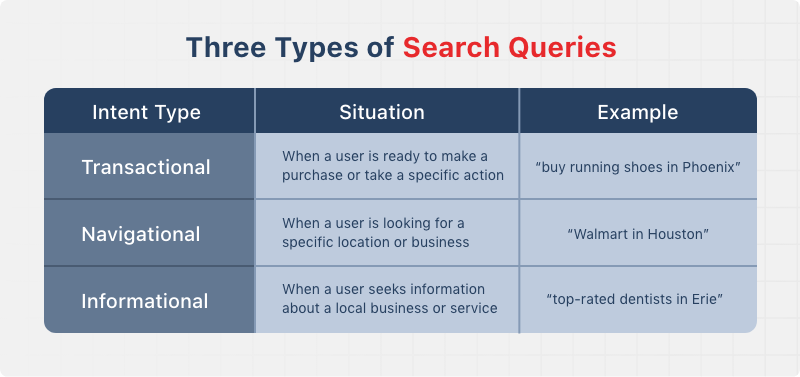Local search intent is a concept that's important for every brick-and-mortar or service-area business to understand. It's the key concept behind local search engine optimization, which any business looking to attract nearby customers through online searches should be focused on.
Understanding and optimizing for local search intent is crucial for generating leads, driving foot traffic, increasing sales, and boosting overall visibility in your local market. In this article, we'll explore what local search intent entails and how businesses and SEO professionals can effectively optimize for it.
What Is Local Search Intent?
Local search intent refers to the intent behind a user's search query that indicates a desire to find local information, products, or services. In other words, local search intent occurs when users search for something with the intention of finding results in a specific geographic area.
Local intent search queries are often accompanied by keywords like "near me," geo-modifiers, like specific city or neighborhood names, or phrases indicating urgency, like "open now."
Common examples of local intent search queries include searches like "coffee shops near me," "best pizza in [City Name]," or "plumber open now." These searches indicate that the user is looking for a product, service, or place within a specific geographical area.
Even if the query doesn't specify an area or contain a keyword like "near me," as is the case with the query "plumber open now," the local intent is implied — users know that Google will show them nearby results by default when they search using general business-related keywords.
Local intent searches can generally be broken down into three different types of queries:
- Transactional: When a user is ready to make a purchase or take a specific action, such as "buy running shoes in [City]."
- Navigational: When a user is looking for a specific location or business, such as "Walmart in [City]."
- Informational: When a user seeks information about a local business or service, like "top-rated dentists in [City]."

Understanding how users express their local intent through search queries helps businesses tailor their local SEO and other digital marketing efforts to meet their audience's needs, ultimately increasing their visibility in local search results, getting more calls, and driving more traffic and business.
The Importance of Local Search Intent Optimization
Optimizing for local search intent is all about ensuring that your business appears in the search results when users perform searches relevant to your offerings in your area. But it's not just about being present in search results; it's also about being present in the right way, with content and listings that match exactly what users are looking for.
How Many Google Searches Have Local Intent?
A large percentage of Google searches have local intent, with some sources estimating that at least 46% of all Google searches seek local information.

This makes local search intent optimization a crucial part of any local business's online marketing strategy. By optimizing for these types of searches, businesses can significantly increase their chances of attracting more local customers, especially via Google Search and Google Maps.
How To Optimize for Local Search Intent
To optimize for local search intent, businesses must focus on several key areas, including Google Business Profile (GBP) optimization, on-page SEO, and content strategies that target local intent.
1. Google Business Profile Optimization
Optimizing your Google Business Profile is not-so-arguably the most important step in optimizing for local search intent.
Your GBP is often the first thing potential customers see when they search for businesses like yours on Google. It appears prominently in local search results and Google Maps, providing users with essential information about your business, including contact information and directions.
To optimize your Google Business Profile for local intent searches:
- Ensure accuracy: Make sure your business name, address, phone number (NAP), and hours (including holiday hours) are accurate and up to date.
- Add relevant categories: Choose GBP categories that accurately describe your business to help Google match your listing with relevant searches.
- Encourage reviews: Positive reviews play a significant role in local search rankings, not to mention have a major influence on customer decisions.
- Keep it updated: Regularly update your GBP with new photos, posts, and offers to keep it fresh, relevant, and engaging.
When done correctly, optimizing Google Business Profile for local search intent can significantly boost your visibility in local search results, making it easier for potential customers to find and choose your business over competitors.
2. On-Page SEO for Local Search Intent
While your Google Business Profile is critical, your business website also plays an essential role in local search intent optimization. On-page SEO involves optimizing the content and structure of your website to improve its relevance for local searches.
Here are some key tactics for on-page SEO optimization:
- Optimize title tags and meta descriptions: Include location-specific keywords in your title tags and meta descriptions to help Google understand your relevance to local searches.
- Create location-based content: Develop content that addresses local topics, events, and issues relevant to your target audience. This helps demonstrate your business's connection to the local community.
- Use schema markup: Implement local business schema markup to provide search engines with structured data about your business, improving your chances of appearing in rich search results like knowledge panels and local packs.
- Optimize for mobile: With a growing number of local searches happening on mobile devices, ensure your website is mobile-friendly and loads quickly on all devices.
By focusing on these aspects of on-page SEO, you can enhance your website's visibility in local search results and better meet the needs of users with local search intent.
3. Content Strategies for Local Search Intent
Content plays a vital role in capturing local search intent. Creating content that aligns with what local users are searching for can help drive more organic traffic to your site.
Consider these content strategies for local search intent optimization:
- Blog about local topics: Write blog posts about local events, news, or issues that are relevant to your audience. This not only helps with SEO, but also positions your business as an active and engaged member of the community.
- Create local guides: Develop guides that offer valuable information about your area, such as "The Best Restaurants in [City]" or "A Guide to [City]'s Parks." These types of content attract local search traffic and establish your business as a helpful resource.
- Highlight local partnerships: If your business collaborates with other local businesses or sponsors community events, create content around these partnerships. This not only boosts your local SEO, but also strengthens your ties to the community.
Local Search Marketing for Search Intent: Additional Tactics
In addition to optimizing your Google Business Profile, doing on-page SEO, and implementing a content strategy based around local intent search queries, local marketing strategies can involve promoting your business through various other online channels to target users with local search intent. This might include, for example, implementing paid online advertising, social media marketing, and email campaigns aimed at local audiences.
Effective local search marketing also involves understanding how many Google searches have local intent and what keywords people are using for local intent search queries in your specific area, in order to be able to tailor your strategies accordingly. Analyzing search trends and user behavior allows you to refine your marketing efforts to focus on the most relevant local intent searches for your business.
Conclusion
Local search intent is a powerful driver of business success, especially for companies that rely heavily on attracting customers from specific geographic areas. By optimizing for local search intent, you can ensure that your business appears prominently in search results when potential customers are looking for the products or services you offer!


